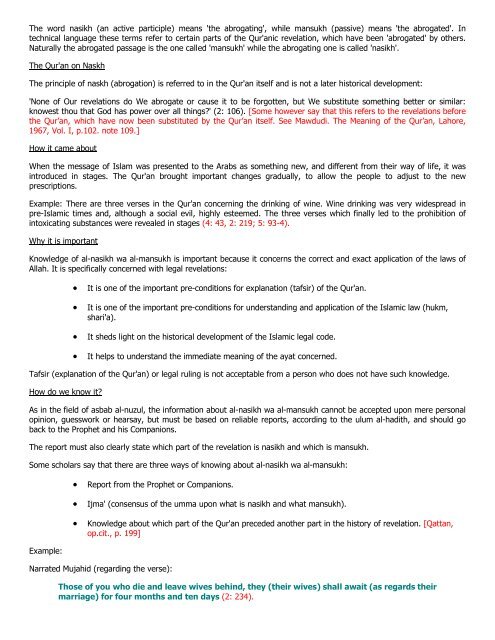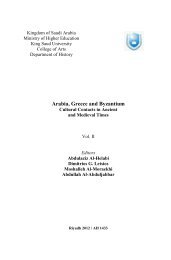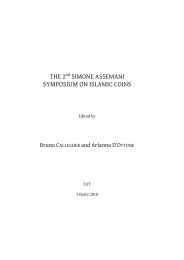ulum-al-quran
ulum-al-quran
ulum-al-quran
Create successful ePaper yourself
Turn your PDF publications into a flip-book with our unique Google optimized e-Paper software.
The word nasikh (an active participle) means 'the abrogating', while mansukh (passive) means 'the abrogated'. In<br />
technic<strong>al</strong> language these terms refer to certain parts of the Qur'anic revelation, which have been 'abrogated' by others.<br />
Natur<strong>al</strong>ly the abrogated passage is the one c<strong>al</strong>led 'mansukh' while the abrogating one is c<strong>al</strong>led 'nasikh'.<br />
The Qur'an on Naskh<br />
The principle of naskh (abrogation) is referred to in the Qur'an itself and is not a later historic<strong>al</strong> development:<br />
'None of Our revelations do We abrogate or cause it to be forgotten, but We substitute something better or similar:<br />
knowest thou that God has power over <strong>al</strong>l things' (2: 106). [Some however say that this refers to the revelations before<br />
the Qur’an, which have now been substituted by the Qur’an itself. See Mawdudi. The Meaning of the Qur’an, Lahore,<br />
1967, Vol. I, p.102. note 109.]<br />
How it came about<br />
When the message of Islam was presented to the Arabs as something new, and different from their way of life, it was<br />
introduced in stages. The Qur'an brought important changes gradu<strong>al</strong>ly, to <strong>al</strong>low the people to adjust to the new<br />
prescriptions.<br />
Example: There are three verses in the Qur'an concerning the drinking of wine. Wine drinking was very widespread in<br />
pre-Islamic times and, <strong>al</strong>though a soci<strong>al</strong> evil, highly esteemed. The three verses which fin<strong>al</strong>ly led to the prohibition of<br />
intoxicating substances were reve<strong>al</strong>ed in stages (4: 43, 2: 219; 5: 93-4).<br />
Why it is important<br />
Knowledge of <strong>al</strong>-nasikh wa <strong>al</strong>-mansukh is important because it concerns the correct and exact application of the laws of<br />
Allah. It is specific<strong>al</strong>ly concerned with leg<strong>al</strong> revelations:<br />
<br />
<br />
<br />
<br />
It is one of the important pre-conditions for explanation (tafsir) of the Qur'an.<br />
It is one of the important pre-conditions for understanding and application of the Islamic law (hukm,<br />
shari'a).<br />
It sheds light on the historic<strong>al</strong> development of the Islamic leg<strong>al</strong> code.<br />
It helps to understand the immediate meaning of the ayat concerned.<br />
Tafsir (explanation of the Qur'an) or leg<strong>al</strong> ruling is not acceptable from a person who does not have such knowledge.<br />
How do we know it<br />
As in the field of asbab <strong>al</strong>-nuzul, the information about <strong>al</strong>-nasikh wa <strong>al</strong>-mansukh cannot be accepted upon mere person<strong>al</strong><br />
opinion, guesswork or hearsay, but must be based on reliable reports, according to the <strong>ulum</strong> <strong>al</strong>-hadith, and should go<br />
back to the Prophet and his Companions.<br />
The report must <strong>al</strong>so clearly state which part of the revelation is nasikh and which is mansukh.<br />
Some scholars say that there are three ways of knowing about <strong>al</strong>-nasikh wa <strong>al</strong>-mansukh:<br />
<br />
<br />
<br />
Report from the Prophet or Companions.<br />
Ijma' (consensus of the umma upon what is nasikh and what mansukh).<br />
Knowledge about which part of the Qur'an preceded another part in the history of revelation. [Qattan,<br />
op.cit., p. 199]<br />
Example:<br />
Narrated Mujahid (regarding the verse):<br />
Those of you who die and leave wives behind, they (their wives) sh<strong>al</strong>l await (as regards their<br />
marriage) for four months and ten days (2: 234).





